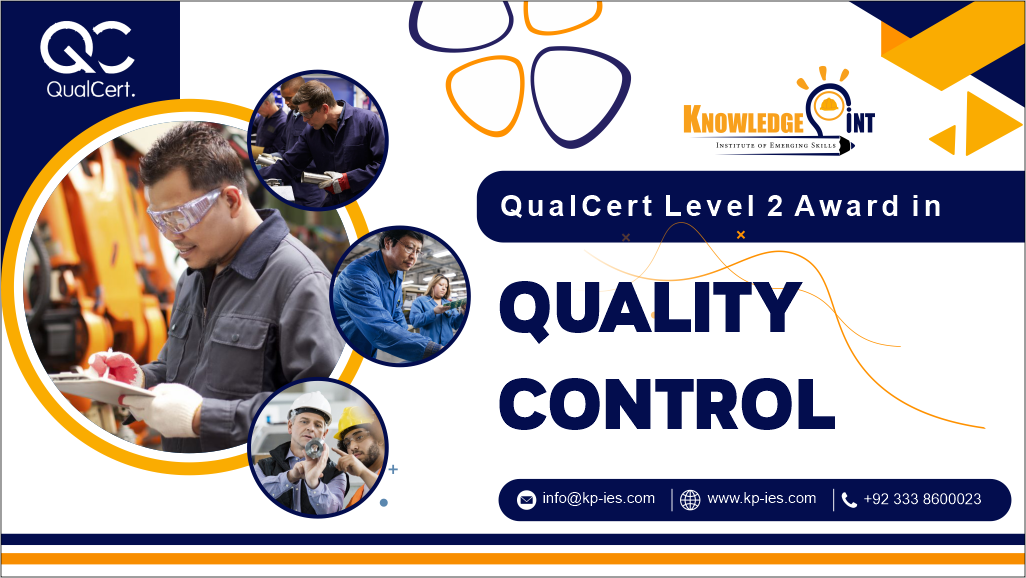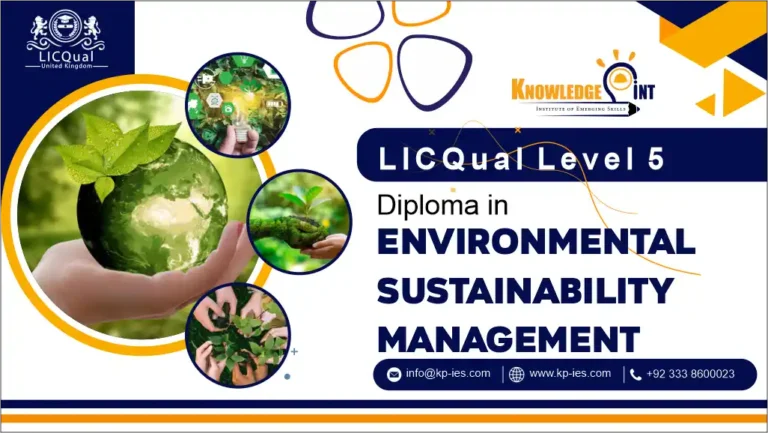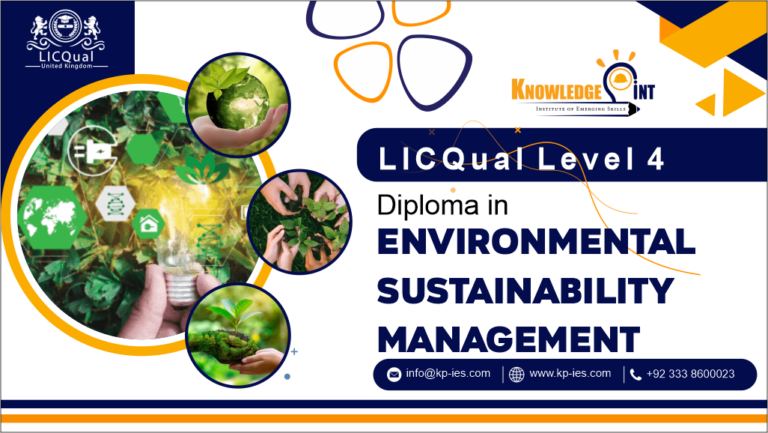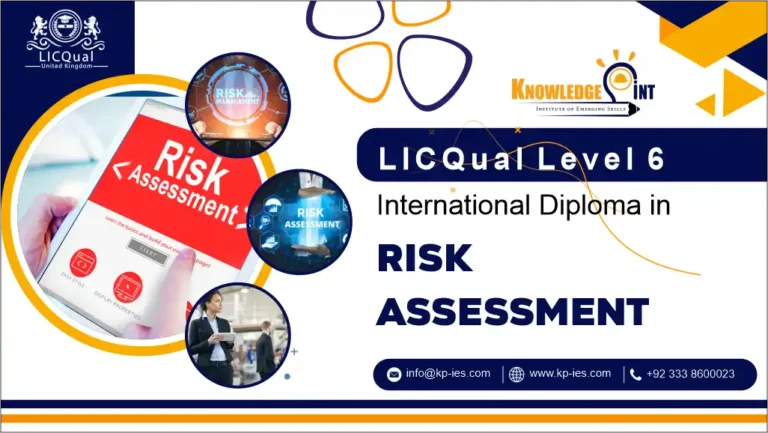Quality control is a cornerstone of success for any organization striving to deliver products and services that meet or exceed customer expectations. The QualCert. Level 2 Award in Quality Control (QC) provides a solid foundation in essential principles, techniques, and practices that ensure consistency, reliability, and compliance with industry standards. Whether you’re starting your career in quality management or seeking to enhance your skills, this award sets the stage for professional growth and career advancement in the field of quality control.
The QualCert. Level 2 Award in Quality Control (QC) is a recognized qualification designed to equip individuals with fundamental knowledge and practical skills in quality assurance and control. This award covers key aspects of quality management, including basic quality concepts, inspection techniques, documentation, and compliance with quality standards. Participants gain hands-on experience in applying quality control tools and methodologies to improve processes and ensure product/service conformity.
The QualCert. Level 2 Award in Quality Control (QC) is an essential stepping stone for individuals aspiring to build a career in quality management. By gaining foundational knowledge, practical skills, and industry recognition, participants are equipped to contribute effectively to quality assurance processes and pursue rewarding opportunities in diverse industries. Embrace the journey towards quality excellence with the Level 2 Award in Quality Control and set yourself apart as a dedicated professional committed to delivering superior quality outcomes.
Course Overview
The QualCert Level 2 Award in Quality Control consists of 8 mandatory units which are as follows.
The learning outcomes of QualCert Level 2 Award in Quality Control include:
Quality Control Principles and Concepts
- Understanding Quality Control: Demonstrate knowledge of fundamental quality control principles, including the importance of quality in product/service delivery.
- Quality Control Systems: Identify different quality control systems and their applications in various industries.
- Quality Control Methodologies: Apply basic quality control methodologies to maintain and improve product/service quality.
Quality Control Tools and Techniques
- Tool Proficiency: Master the use of quality control tools such as Pareto charts, cause-and-effect diagrams, and control charts for data analysis and problem-solving.
- Application Skills: Apply quality control tools effectively to identify root causes of quality issues and implement corrective actions.
- Tool Selection: Select appropriate tools and techniques based on specific quality control challenges and organizational requirements.
Quality Standards and Regulations
- Compliance Knowledge: Understand industry-specific quality standards (e.g., ISO 9001) and regulatory requirements applicable to quality control processes.
- Implementation Skills: Implement quality standards effectively to ensure product/service conformity and compliance with regulatory bodies.
- Continuous Monitoring: Monitor changes in quality standards and regulations to adapt and maintain compliance.
Quality Inspection and Testing
- Inspection Techniques: Conduct quality inspections using appropriate methods and techniques to verify product/service quality against specified criteria.
- Testing Proficiency: Perform quality testing procedures to assess product/service performance and functionality.
- Data Interpretation: Interpret inspection and testing results to make informed decisions and take corrective actions as necessary.
Quality Documentation and Reporting
- Documentation Skills: Develop and maintain accurate and comprehensive quality documentation, including records of inspections, tests, and quality assurance activities.
- Reporting Accuracy: Prepare clear and concise reports on quality metrics, trends, and improvement initiatives for stakeholders and decision-makers.
- Document Control: Implement document control procedures to ensure the integrity, accessibility, and confidentiality of quality-related information.
Advanced Problem Solving
- Problem Analysis: Utilize advanced problem-solving techniques such as DMAIC (Define, Measure, Analyze, Improve, Control) to analyze complex quality issues and identify root causes.
- Solution Implementation: Develop and implement effective solutions to resolve quality problems and prevent recurrence.
- Continuous Improvement: Foster a culture of continuous improvement by promoting proactive problem-solving and innovation in quality control processes.
Quality Assurance and Continuous Improvement
- Quality Assurance Processes: Implement quality assurance processes to prevent defects, ensure consistency, and meet customer requirements.
- Continuous Improvement Initiatives: Lead or participate in continuous improvement projects aimed at enhancing quality control processes and operational efficiency.
- Quality Metrics: Define, measure, and analyze quality metrics to evaluate performance and drive improvements across organizational functions.
Safety and Quality Integration
- Safety Standards Knowledge: Integrate safety standards and practices with quality control processes to ensure workplace safety and product/service quality.
- Risk Management: Identify, assess, and mitigate quality-related risks to prevent safety hazards and ensure compliance with safety regulations.
- Cross-functional Collaboration: Collaborate with safety professionals and stakeholders to implement integrated safety and quality management systems that optimize overall organizational performance.
These learning outcomes equip individuals with essential skills, knowledge, and competencies to effectively manage and improve quality control processes, ensuring product/service excellence and organizational success in diverse industries.
Course Benefits of the QualCert Level 2 Award in Quality Control :
1. Specialized Expertise
- Auditing Proficiency: Gain specialized knowledge and skills in auditing energy management systems according to the ISO 50001:2018 standard.
- Industry Recognition: Earn a globally recognized qualification that demonstrates your proficiency as an energy management systems auditor.
2. Career Advancement
- Expanded Career Opportunities: Qualify for roles such as Lead Energy Auditor, Energy Management Consultant, or Compliance Officer.
- Higher Earning Potential: Enhance your value to employers and increase your earning potential with specialized expertise in energy management auditing.
3. Industry-Relevant Skills
- Practical Application: Acquire practical skills and techniques for planning, conducting, and documenting energy management system audits.
- Effective Communication: Develop communication skills to interact with auditees, audit teams, and stakeholders effectively.
4. Contribution to Sustainability
- Promotion of Energy Efficiency: Play a key role in promoting energy efficiency and reducing environmental impact within organizations.
- Support for Sustainable Practices: Assist organizations in implementing and maintaining energy management systems that support sustainability goals.
5. Quality Assurance
- Compliance Assurance: Help organizations achieve compliance with ISO 50001:2018 requirements and other relevant regulatory standards.
- Risk Mitigation: Identify areas of non-conformance and provide recommendations for corrective actions to mitigate risks.
6. Continuous Professional Development
- Lifelong Learning: Engage in continuous professional development by staying updated with the latest developments and trends in energy management auditing.
- Networking Opportunities: Connect with industry professionals, auditors, and experts, expanding your professional network and opportunities.
7. Organizational Benefits
- Improved Performance: Contribute to the improvement of organizational energy performance through effective auditing and recommendations for continuous improvement.
- Enhanced Reputation: Help organizations build a positive reputation for their commitment to energy management and sustainability practices.
8. Personal Growth
- Leadership Development: Develop leadership skills to effectively manage audit teams, delegate tasks, and ensure audit objectives are met.
- Confidence Boost: Gain confidence in your abilities as an energy management systems auditor through practical training and hands-on experience.
The QualCert. Level 2 Award in Quality Control (QC) provides a solid foundation in essential quality management principles and practices, opening up several avenues for future progression and career advancement. Here’s a look at potential pathways for individuals who complete this qualification:
1. Quality Technician or Inspector
Graduates can pursue entry-level positions as Quality Technicians or Inspectors. In these roles, they are responsible for conducting inspections, testing products, and ensuring compliance with quality standards and specifications. This role serves as a stepping stone to gain hands-on experience in quality control processes.
2. Quality Assurance Coordinator
With additional experience and skills gained from the Level 2 Award, individuals can advance to roles such as Quality Assurance Coordinator. These professionals oversee quality assurance activities, manage documentation, and support continuous improvement initiatives within an organization. They play a crucial role in maintaining and enhancing product/service quality.
3. Quality Control Analyst
Quality Control Analysts analyze quality data, identify trends, and propose solutions to improve processes and reduce defects. They use advanced analytical tools and techniques learned during the award program to ensure consistent quality and efficiency in production or service delivery.
4. Further Education and Certifications
The Level 2 Award serves as a solid foundation for pursuing further education and certifications in quality management. Graduates can pursue advanced qualifications such as the Level 3 Diploma in Quality Control or certifications in specialized areas like Six Sigma or Lean methodologies. These credentials enhance their expertise and increase their competitiveness in the job market.
5. Career Progression in Quality Management
With continuous learning and practical experience, individuals can progress into roles such as Quality Control Supervisor or Quality Manager. These positions involve overseeing entire quality control departments, managing teams, implementing quality strategies, and ensuring organizational compliance with industry standards and regulations.
6. Industry Specialization
Depending on the industry sector, graduates can specialize in specific areas of quality control, such as automotive quality management, pharmaceutical quality assurance, or food safety management. Specialization allows individuals to focus on industry-specific standards and practices, becoming subject matter experts in their chosen field.
7. Consulting and Advisory Roles
Experienced professionals may choose to transition into consulting or advisory roles, offering expertise to organizations seeking to improve their quality management systems and processes. Consultants provide valuable insights, recommend best practices, and support clients in achieving and maintaining quality excellence.
8. Entrepreneurship
Some graduates may choose to start their own quality consulting businesses or quality assurance firms. Entrepreneurial ventures allow individuals to leverage their skills, experience, and industry knowledge to serve clients across various sectors, contributing to industry advancements and innovation.
The QualCert. Level 2 Award in Quality Control (QC) provides a versatile foundation for individuals aspiring to build successful careers in quality management. Whether starting as a Quality Technician or progressing to managerial roles, completing this award equips individuals with the skills, knowledge, and certifications necessary to thrive in the dynamic field of quality control and assurance. Continuous learning and professional development further enhance career prospects, enabling individuals to make significant contributions to organizational success and industry standards.







